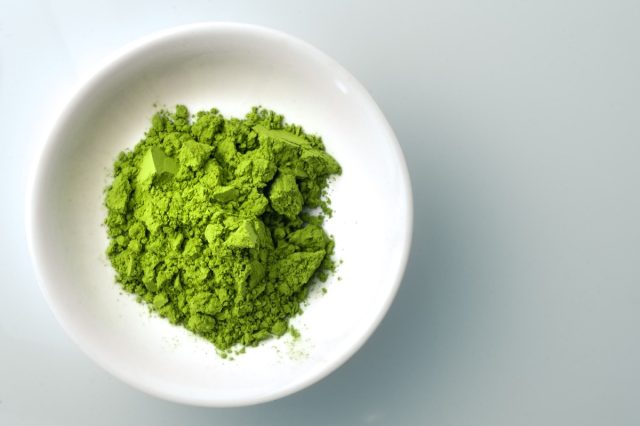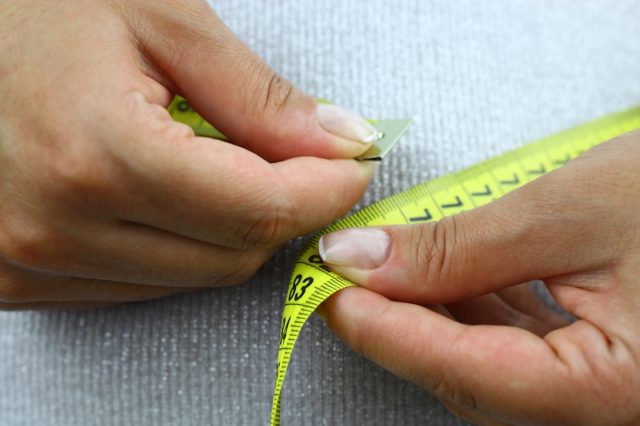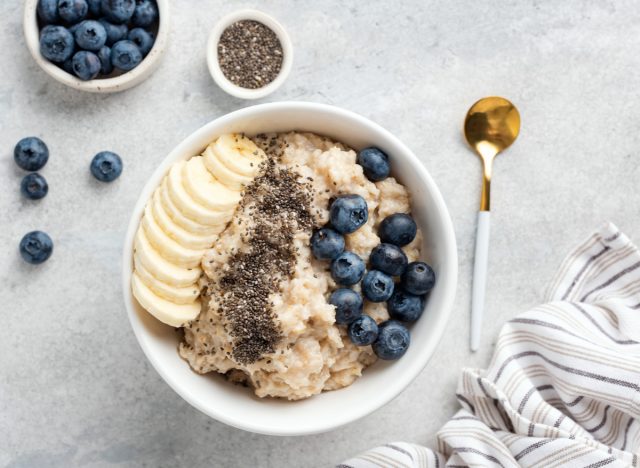One of the most stubborn places to lose weight is in the abdomen. You may notice that the pounds just don't want to come off around your belly, no matter what you try.
"We store fat all over the body, yet people are quick to notice abdominal fat changes and tend to focus on targeted fat loss in this area," says Brittany Michels, MS, RDN, LDN, registered dietitian nutritionist with The Vitamin Shoppe. "Unfortunately, research on targeted fat loss isn't promising; however, exercise and dietary habits can reduce overall body fat, including the abdominal region."
While diet and lifestyle changes are the way to go when it comes to losing abdominal fat, supplementation can also help. And according to Michels, the one supplement you should be adding to help you achieve your belly fat loss goals is green tea extract.
How green tea extract supplements can support abdominal fat loss.

"Green tea contains both caffeine and the flavonoid epigallocatechin gallate (EGCG), which help speed up metabolism and trigger the breakdown of fat molecules," she says.
She notes that studies confirm that moderate consumption of green tea may reduce waist circumference, belly fat, and overall body fat mass.
"If you're not a fan of drinking the 3+ recommended cups of green tea daily to support fat loss, consider taking green tea extract in capsule form," she says. "The concentration of EGCG in a green tea extract supplement is what's most important for abdominal fat loss."
Of course, no single supplement will help you lose abdominal fat alone. By adding in healthy eating habits, exercise and green tea, you're on the way to seeing the results you want.
The best diet and lifestyle changes to make to lose abdominal fat.

While it may take more effort and trial and error to get rid of belly fat, there are many diet and lifestyle changes you should be making. These include:
Cutting added sugar.

"Studies suggest that added sugar can lead to fat accumulation around your abdomen and liver," explains Michels. "Sugar provides empty calories that digest quickly and spike blood glucose rapidly. It sets off a metabolic response that jumps and crashes blood sugar levels, leaving you feeling hungry sooner. If not used for immediate energy, sugar may be stored as fat."
To decrease your consumption of added sugars, she suggests that you assess your current added sugar intake by reading food labels, and gradually decrease the number you come up with by several grams each week until your goal is reached.
"Surprising foods with high added sugar include yogurt, dressing, sauces, (like BBQ, ketchup, spaghetti sauce), granola, breakfast cereals & cereal bars, flavored coffee, pre-made soup, crackers, fruit juice, and canned fruit," she says.
According to Michels, the biggest ways to decrease your consumption of added sugar include swapping out sugar-sweetened beverages with lower or no-added-sugar options, and swapping out candy, cookies, and sugar-sweetened snacks with fresh fruit, cut-up vegetables, or any lean protein source (like a protein shake, hard-boiled egg, uncured beef jerky).
Focusing on soluble fiber.

"Soluble fiber is found in plant foods and has a gel-like consistency that slows down digestion, improves satiety, and aids in blood sugar management," says Michels. "The average American diet is very processed and low in fiber."
One five-year-long study found that consuming 10 grams of soluble fiber per day reduced abdominal fat by 3.7%.
To increase your intake of soluble fiber, Michels suggests first assessing your current soluble fiber intake, and gradually increase it to at least 10 grams daily.
"Soluble fiber food sources include oatmeal, flax, beans, carrots, green beans, broccoli, navel oranges, avocados, grapefruit, strawberries," she says.
"Those who are unable to meet this minimum fiber goal from whole foods alone would benefit most from a soluble fiber supplement."
Incorporating weight training and cardiovascular exercise.

Incorporating weight training and cardiovascular exercise are two of the most effective healthy habits for reducing abdominal fat.
"These activities have also been found to decrease the risk of chronic disease and aid in weight management," says Michels. "Exercise also aids in blood sugar management and stress reduction, which are both associated with abdominal fat when not in check."
According to the U.S. Department of Health and Human Services Physical Activity Guidelines for Americans, you should aim for a minimum of (1) 150 minutes of moderate-intensity cardiovascular exercise per week and (2) 2 weekly strength training sessions, exercising each of the 5 major muscle groups (chest, back, arms, shoulders, abdominals) with a minimum of 1 set for 8-12 reps.
"Those that schedule and write down their workouts on their calendar are more likely to stick to them," says Michels. "If you don't have 30 minutes at once, consider breaking up your activity into three, 10-minute sessions throughout the day."
No comments:
Post a Comment